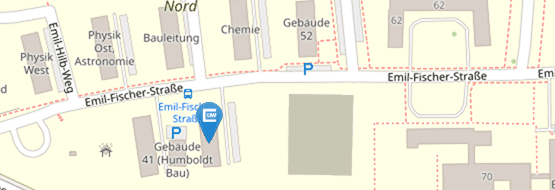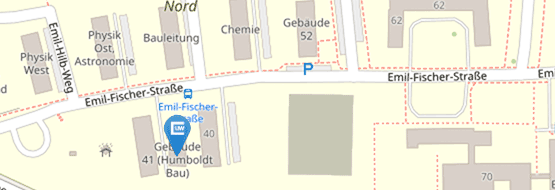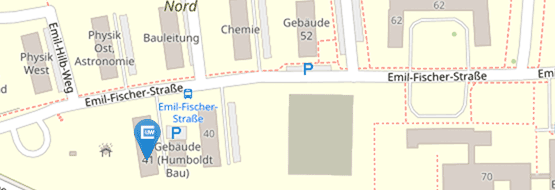Economathematics (Bachelor)
Bachelor's degree in Economathematics
| Degree: | Bachelor of Science |
| Target duration: | 6 semesters |
| Start: | Winter semester |
| Admission: | free |
| Credits: | 180 ECTS points |
| Target group: | Students interested in the Mathematics concerning the economic and financial sectors |
| Qualification targets: | Qualification targets Bachelor Economathematics (180 ECTS) |
| Accreditation: | program accredited till September 30, 2028 |

The bachelor's degree program in Economathematics is offered as an application-oriented degree program by the Faculty of Mathematics and Computer Science and by the Faculty of Business Management and Economics of the Julius-Maximilians University of Würzburg. The aim of the training is to support the future economists with knowledge in the most important areas of mathematics, computer science and economics:
- characteristic methods of mathematical reasoning and working
- in-depth knowledge of special methods of Applied Mathematics and Stochastic, which are particularly important for applications in Economics
- an understanding of issues for economic order and enterprise policy in a market-based economic system
- Basic knowledge of computer science
The chances in the job market for Economathematicians are generally rated as good. According to the Federal Employment Agency, the professional situation has significantly improved in recent years. Economathematics has been applied in almost all economic sectors.
Economathematicians can be found in industrial departments, in insurance and banking agencies, in technology developers or directly in universities, research institutes, and ministries. The main tasks of economathematicians are
- in insurance and credit,
- in the operational IT organization,
- in research and development,
- in education and training,
- in finance and accounting
- with DV manufacturers,
- at software companies,
- at management consultancies and market research institutes,
- at banks, building societies or professional care institutions.
In the self-employment, they also work as a management consultant or qualified expert.
Economathematicians are often employed in interdisciplinary teams. More precisely, they are usually professional employees within a group that mainly consists of non-mathematicians. Their main duty is therefore to transfer a given task from the terminology of the applied field into the language of mathematics. This transfer provides mathematical solutions that can be translated back into the technical language of the corresponding applied field.
Typical tasks are
- analysis of scientific, economic or organizational problems,
- profitability calculations and optimization of operational processes,
- formulation of suitable mathematical models,
- development of new methods as well as adaptation and application of known mathematical techniques,
- use of computers to solve specific problems,
- analysis of financial market instruments,
- management consultancy,
- analysis of markets (e.g., labor market, goods markets).
Structure
- During the first three semesters, with a curriculum that is essentially compulsory, you will become familiar with the basics of mathematics, computer science and economics. In the second part of the study (semester four through six), you can choose lectures and seminars according to your inclinations.
- During this time, you will also complete your compulsory internship of at least 6 weeks in the industry. The internship will be about business or administration, which address relevant problems as well as they train in the practical application of the knowledge acquired during the study program.
- Towards the end of your studies, you will prepare your written bachelor thesis under supervision of a lecturer.
Examples of a study course plan (overview of modules to be completed)
Basics and orientation exam
After the second the successful completion of Analysis 1 or 2 or Linear Algebra 1 or 2 is required as well as 10 ECTS (i.e. two courses) of the compulsory courses in economics. If this is not achieved, you have to pass at least one of the modules about Overview Analysis or Overview Linear Algebra (i.e. one of the oral examinations) as well as 15 ECTS (i.e. three courses) of the compulsory economic program by the end of the third semester. If this is not achieved either, the bachelor's degree program is failed.
Graduation
If you have earned 180 ECTS credits under the Examination Regulations, you will receive the academic degree of a Bachelor of Science.
Study and Examination Regulations
- General study and examination regulations for Bachelor and Master programs (ASPO)
- Subject specific provisions for the bachelor program in Economathematics (PO 2022)
The examination board is responsible for
- Recognition questions at the beginning of studies for achievements acquired in previous study programs or at another study location,
- Recognition questions in the current study
- Gender Equality
In mathematics, the following four modules are compulsory:
- Overview Analysis (13 ECTS)
- Overview Linear Algebra (13 ECTS)
- Stochastics 1 (10 ECTS)
- Introduction to Stochastic Financial Mathematics (9 ECTS)
The modules called "Overview" correspond to oral exams about the contents of Analysis 1 and 2 or Linear Algebra 1 and 2. Hence you are supposed to attend both lectures, but only to pass the written exam of one part.
You have to pass at least one of the following written exams:
- Analysis 1 (5 ECTS)
- Analysis 2 (5 ECTS)
You have to take at least one of the following courses:
- Numerical Mathematics 1 (10 ECTS)
- Stochastics 2 (10 ECTS)
- Advanced Analysis (10 ECTS)
- Ordinary Differential Equations (10 ECTS)
- Introduction to Functional Analysis (10 ECTS)
- Optimization for Machine Learning (10 ECTS)
- Applied Stochastics Lab (6 ECTS)
- Machine Learning an Numerics Lab (6 ECTS)
The the following seven modules are compulsory:
- Organization (5 ECTS)
- Microeconomics 1 (5 ECTS)
- Macroeconomics 1 (5 ECTS)
- Macroeconomics 2 (5 ECTS)
- Supply, Production and Operations Management (5 ECTS)
- Investment and Finance (5 ECTS)
- Economic Principles of Risk Management (5 ECTS)
At least three more courses with 5 ECTS each must be completed in the elective-subject area of business administration. You can choose from a wide range of possible lectures and available seminars according to your own interests. The complete list can be found in the module catalogue.
The computer science section consists of the two compulsory modules
- Basics in Algorithms and Data Structures (10 ECTS)
- Practical Course in Programming (5 ECTS, during the lecture-free period)
In this section the module Software Technology (10 ECTS) can be taken. This module is required for admission to the master programme Business Informatics.
The key skills (KS) are divided into general KS (5 ECTS) and subject-specific KS (15 ECTS). The latter includes an external internship of about 6 weeks.
With the general KS, you can choose from a huge selection of suitable modules from all faculties. Very popular are language courses. The current list can be found on this page
The subject-related KS are further subdivided into
- Compulsory modules (12 ECTS)
- Preliminary course (2 ECTS, directly before the 1st semester)
- Propaedeuticum (2 ECTS, 1st semester)
- external internship (8 ECTS)
- Elective modules (3 ECTS), see the module catalogue
The approximately six-week internship in a company or in another economic organization should provide the necessary practical experience. The internship should promote the practical mediation of relevant problems and the implementation of acquired knowledge during the study. The internship also includes a further presentation (about 20 minutes) of the internship report (10-20 pages). Before starting an internship, students must obtain the commitment of a lecturer in mathematics or economics to supervise this internship. The examination activity for this module is then delegated to these lecturers.
A confirmation that the internship is compulsory can be found here. If you require an individual certificate, contact the student advisory service.
The exact procedure (prior registration, specifics of the report, etc.) is individually regulated by the lecturer who supervises the internship. In general bonuses must be achieved before the beginning of the internship.
Ideally, copies of the employment contract and possibly the certificate of employment should be added for documentation purpose to the internship report (for individual consultation with the supervising lecturer).
No explicit registration with the examination office is required before starting the internship, but the supervision of a lecturer should be established. Once everything is complete, the supervising lecturer will inform the examination office of Economathematics. The documentation of the internship is uniquely provided by the respective lecturer. An internship certificate is not required by the examination office.
The Bachelor thesis (BAT, 10 ECTS) is the last major exam of your Bachelor's program. The purpose of this written manuscript is to show that you are able to work scientifically on a mathematical or economical problem within a period of ten weeks. No new scientific knowledge is expected from you, only the skills required for a scientific approach.
You should start writing your BAT at least ten weeks before the end of your 8th semester, so that you can still use the full remaining time to complete the work before the beginning of your 9th semester. At the beginning of the 9th semester, your Bachelor degree program is considered failed for the first time.
In order to get a topic for your thesis, you can first check the bulletin boards in front of the Mathematics Library: there you can find several suggestions about different areas of mathematics and different supervisors. Eventually, you should personally contact a Lecturer in mathematics according to your mathematical interests (see Overview of the Chairs of the Institute of Mathematics) and define a topic directly with him / her (your own suggestions are possible!).
In addition, it is allowed to choose a topic related to the faculty of economics. The application for a topic must be preventively done through a central allocation system. You can find further information here.
Once you will find a supervisor and a subject for your thesis, please print out this form, fill it out together with your supervisor and give it to Ms Schmid (Mathematik Ost, Zi. 00.016). This will make the topic of your thesis and the date of submission (date of issue of the topic + 10 weeks) official and binding.
Only in well-justified cases (incapacity for examination, with attest!) the processing time can be extended upon application to the examination board and in consultation with the supervisor.
For regulations concerning passing the thesis to the university see here.
Everything applies as in the current version of the winter semester 2017/2018, except that there is still freedom of choice between the basics in algorithms and data structures (with business information systems) and algorithms and data structures (with computer science).
Subject-specific provisions for the bachelor program of Economathematics (PO 2015)






